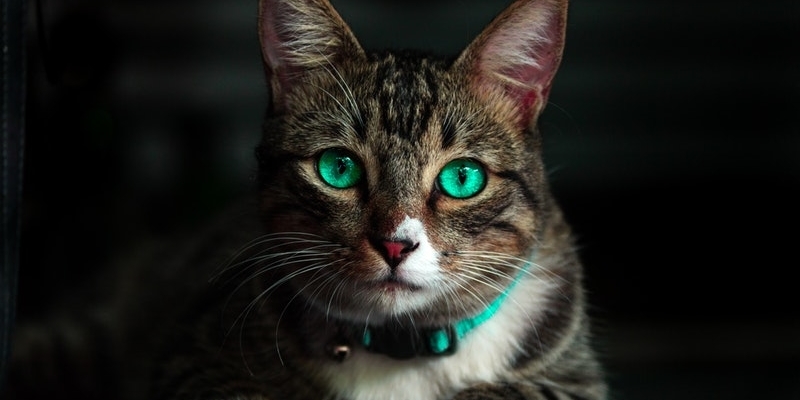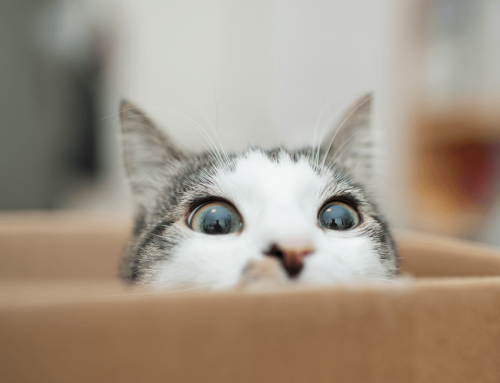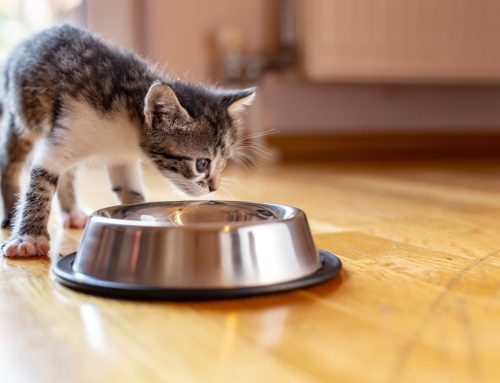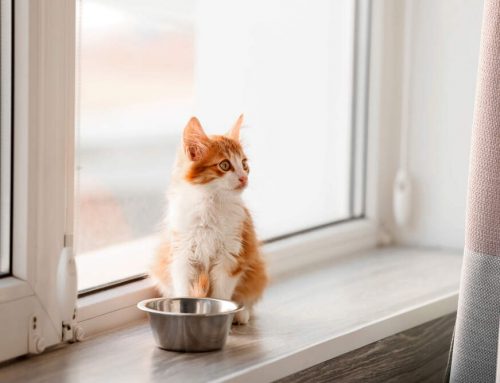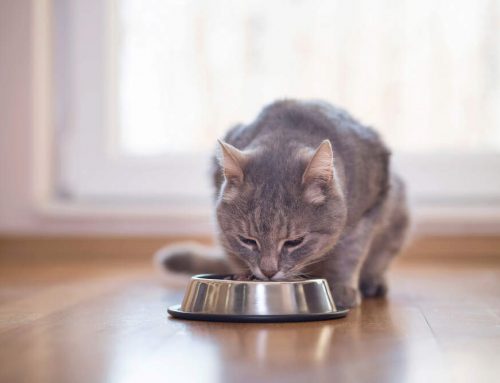You’ve been there many times: you’re snacking and your cat is cuddled up next to you, watching you eat and seeming to ask, with her cute, shining eyes, for a taste. You want to share but you wonder, can cats eat people food? Is human food bad for my cat?
For the most part, human food is safe for felines in small quantities (though the best diet for your cat is one comprised strictly of high-quality cat food). But there are certain human foods that are toxic to cats. This list will show you which human foods cats should not eat and why they are dangerous so that you can protect your pet from these harmful ingredients.
What Not to Feed Cats
1. Chocolate
2. Grapes and raisins
3. Raw meat, eggs, and fish
4. Raw dough
5. Onions and garlic
6. Alcohol
7. Coffee and caffeine
8. Milk and other dairy products
9. Foods containing Xylitol
Why are these foods toxic to cats?
Chocolate
Cats should not eat chocolate because it contains theobromine and caffeine—both methylxanthines—which are stimulants that are bad for felines’ hearts, muscles, and nervous systems. This includes drinks and baked goods. Darker chocolate has higher concentrations of these stimulants than milk chocolate or white chocolate and is more dangerous for cats to ingest. You should keep your pet away from any chocolate, though, regardless of what kind it is.
Grapes and raisins
Something in grapes and raisins is toxic for cats to consume but the specific culprit is still unknown. Nonetheless, these fruits often agitate the digestive system and cause vomiting and diarrhea. Large amounts can cause serious health issues so store grapes and raisins out of reach of your pet.
Raw meat, eggs, and fish
Raw meat and eggs are toxic for cats in the same way that they are toxic to humans. Before they’re cooked, these foods can contain salmonella and E. coli bacteria, which are bad for pets. Raw eggs also contain avidin, an enzyme that can irritate her coat and skin. As an additional precaution, always wash your hands after you’ve handled these raw foods so that you don’t accidentally expose your cat to them by petting her or touching her food. Fat trimmings are bad for your cat, too, as they can affect the pancreas. Fish, meanwhile, is a common ingredient in cat foods but fish that is not specifically prepared for cats can be dangerous.
Raw dough
Do not let your cat eat raw dough, as it can expand in her digestive system and cause bloat or a twisted stomach. The yeast in the dough also produces alcohol, which is dangerous for cats to consume.
Onions and garlic
Eating more than a very small amount of onions, garlic, chives, scallions or other members of the onion family is toxic and can disrupt your cat’s digestive system. Consuming these ingredients for a long period of time could also damage red blood cells.
Alcohol
Cats can’t drink alcohol because it causes vomiting and diarrhea, as well as difficulty breathing, shaking, disorientation, and liver and neurological damage. Even tiny amounts are extremely dangerous. Any foods or sauces containing alcohol, including raw dough, are equally toxic.
Coffee and caffeine
The stimulants in caffeinated drinks—especially coffee, tea and energy drinks—are bad for your cat and can disrupt her breathing, heart and muscles. Caffeine can cause shaking, increased body temperature, changes in heart rhythm, vomiting and diarrhea. Caffeinated sodas and snacks that include caffeine are also toxic to pets.
Milk and other dairy products
It might be surprising to learn that milk can be toxic to your cat. Many adult cats become lactose intolerant and, therefore, struggle to digest the lactose in milk. This can upset their digestive system and cause diarrhea. Though it’s not bad for all cats, it’s safer to avoid feeding your cat dairy products. If you do, it’s important to watch them for signs that they’re lactose intolerant.
Foods containing Xylitol
It’s likely toxic to your cat, but what is xylitol and how can you avoid it? Xylotil is an artificial sweetener that cats should not eat. It’s commonly used in candy and sugar-free snacks. In most pet species, it can cause a drop in blood sugar, which leads to other health issues. Don’t let your cat eat such things as toothpaste, chewing gum or candies that contain this ingredient.
Prevention and Treatment
The most effective way to prevent your cat from eating toxic food is to keep it hidden and stored in closed containers or in the fridge. Don’t underestimate your cat’s cleverness and ability to reach areas you thought were safe. Resist her adorable temptations: don’t feed her from the table and she won’t expect human food. Feed her only high-quality cat food to give her exactly what she needs to be healthy and active.
If you think your cat ate something that’s bad for her, try to determine how much she ate and call your veterinarian. Watch her closely for symptoms and follow the vet’s medical advice. Or, make an appointment to have her checked so that you have peace of mind and she has the best treatment.
What human foods can cats eat?
Not all human foods are toxic to cats. If you just can’t help but feed your pet tastes of what you’re eating, make sure it’s one of these safe human foods for cats. Of course, any snacks should only be given in small quantities and not often.
Learning about the foods that are most toxic to cats will help you to make your home safer and to feed your feline only what’s good for her. Store away anything that’s dangerous to her and feed her only nutrient-rich cat food to promote good health from the inside out.
SOURCES
- Ultimo, Caitlin. “Can Cats Drink Milk?” Chewy, Chewy, Inc., 26 May 2018.
AvoDerm and AvoDerm Natural are registered trademarks of Central Garden & Pet Company.

